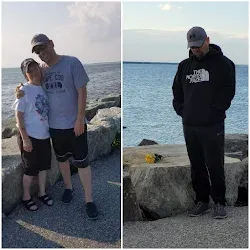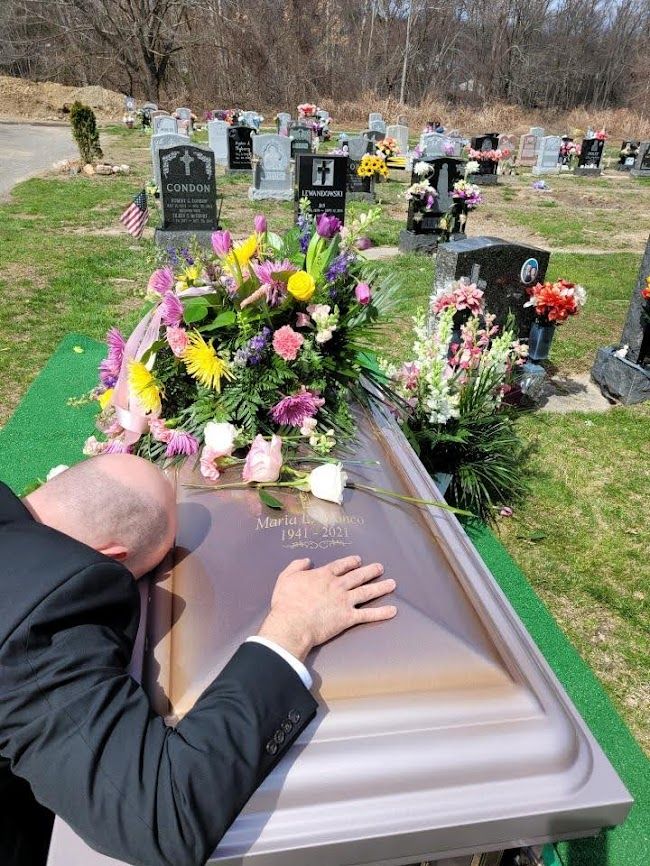Grief is just love with no place to go
“Grief, I’ve learned, is really just love. It’s all the love you want to give, but cannot.

“Grief, I’ve learned, is really just love. It’s all the love you want to give, but cannot. All that unspent love gathers up in the corners of your eyes, the lump in your throat, and in that hollow part of your chest. Grief is just love with no place to go.”
– Jamie Anderson, an English writer, director, and producer.
This quote immediately comes to mind when I read the index card that I pulled out of a deck of cards about “Understanding Grief.” The quote on the card reads:
“Your grief is real, because the love was real. Do not doubt your grief. Do not let it be minimized. The intensity of the grief is there because of the intensity of the love.”
A quick look at a Thesaurus for synonyms for the word “grief” comes up with words like heartache, despair, pain, agony, miserableness, unhappiness, distress, despondence, desolation. Antonyms for the word “grief” are listed as joy, euphoria, elation, cheerfulness, exhilaration, hopefulness, rapturous, and ecstasy.
By definition the word “antonym” means the complete opposite of those wonderful emotions listed in that last sentence. Who wouldn’t want to be elated? Who wouldn’t want to be enveloped in the ecstatic feeling of rapture? That sounds great, euphoric even. Yet grief is as far removed from those emotions as you can be, hence the word antonym.
Yes, grief is real. To try to deny it when it smacks you straight in the face is to fail to proceed with one’s life, as if hitting a wall and pretending it is not there. It is like having your car getting rammed in a demolition derby and you keep spinning your wheels, but your car is jammed, nose to nose, with the other car. It is not going anywhere no matter how hard you press down on the accelerator. The damage has been done. You will need help from a tow truck to dislodge your car, unless you just decide to remain seated in the car, stuck in the same spot forever - never asking for help.
That is what grief feels like. You need to face it. But you will need help. You cannot do it alone. The grief is not going to go away. You are now damaged goods. Your heart has been broken. Your will is diminished. Your spirit is deflated. Just like a new car once it has been in an accident, it will never feel quite the same. A grieving person is changed forever.
Most of us will get into a car accident in our lives. The anguish we feel directly correlates to the value of the car. It could be the monetary value of the car that has an impact on our level of sorrow. I would think you would regret smashing up a Ferrari more than wrecking your Toyota Camry. However, that is not to say that you don’t feel any pain from losing your Camry. Perhaps that car had sentimental value to you that others are not aware of. From an outsider’s point of view, if someone sees you sobbing over losing your Camry, people might be whispering amongst themselves, “It was only a Camry.”
However, if you drive by an accident on the highway and look over and see a Ferrari all smashed up on the side of the road, you would probably say to yourself, “Wow! That sucks! I feel bad for the owner.” Why feel bad for the owner of the Ferrari, yet minimize that same empathy for the owner of the Camry?
What if I told you the owner of the Ferrari owned twenty Ferraris? And what if I then told you that the Camry was given to the owner as a gift by a parent who died shortly thereafter? Or perhaps the Camry had some other sentimental value. People’s first instinct is to look at the monetary value of things, but other things contribute to the value of the object in question, or person.
In my case, I lost my mother. I know I am not the only one to have lost his mother. It happens all the time. Every day thousands, maybe even millions, of sons and daughters across the world are losing a parent. I know I am not alone in my anguish. Yet, like the above quote suggests, that does not minimize my pain. I deserve to feel what I do. And despite so many other people losing their parents and managing to continue with life easily, that does not mean I have to do the same. I am my own person and my individual grief is specific to me. I cannot be expected to deal with loss like others because my love for my mother may have been significantly different than others – and it was.

I loved my mother more than anything in life, more than life itself. She gave me purpose to life. She gave me joy, elation, hopefulness - all those wonderful things. Every day I looked forward to seeing her, even if it was just to sit at the kitchen table watching her peel potatoes, wash dishes, or make a cake. I just enjoyed being in her presence. She radiated love, and I like to think I radiated it back equally.
I will never feel that feeling of pure love again. Now that she is gone, the air feels empty around me. I will never feel that confluence of beautiful energy swirling in the air between us like two angels dancing. It always felt like watching an aurora borealis between us when we were together. It was beautiful.
I visit her at the cemetery every day trying to recapture some of that same feeling, but it is not the same. And I know it never will be. I am sure I will feel love again, and maybe I do now for other people, but that bond between a mother and child is singular. There is no other entity that you can honestly say you were, literally, a part of them. We formed inside our mothers. They sacrificed almost a year of their lives carrying us inside of them, and countless other years protecting and taking care of us. No one else can say that.
That is why when I read Jamie Anderson’s quote for the first time, it resonated so much with me. I didn’t understand why I was, and still am two years later, grieving so much for the loss of my mother. But when I read that quote, I understood that because I loved her so much, the intensity of my grief has been so great. And, in a way, that quote gives me a little bit of solace in understanding, and confirming to myself, how much I loved my mother.

